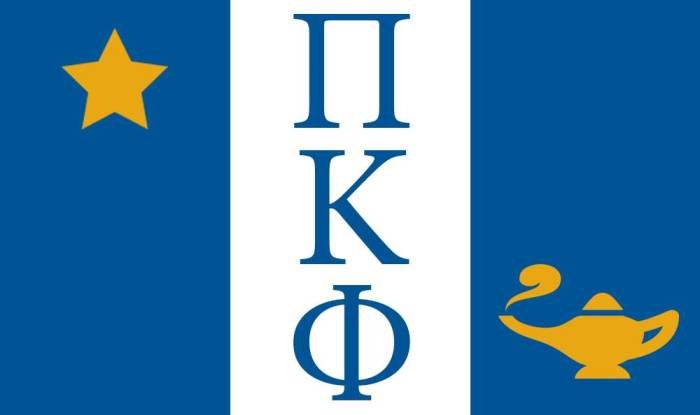The Pi Kappa Phi National Exam is a crucial assessment that plays a vital role in shaping the operations and performance of Pi Kappa Phi chapters. This comprehensive guide delves into the purpose, content, preparation strategies, and impact of this pivotal exam, empowering chapters to excel and achieve their full potential.
From its origins and evolution to the specific subject areas covered and the format of the exam, we’ll explore every aspect of the Pi Kappa Phi National Exam, providing insights that will enable chapters to navigate this assessment with confidence and achieve their desired outcomes.
Pi Kappa Phi National Exam Overview

The Pi Kappa Phi National Exam is a comprehensive assessment designed to evaluate the knowledge and understanding of Pi Kappa Phi members regarding the fraternity’s history, values, and policies.
Established in 1957, the exam has undergone several revisions over the years to ensure its relevance and effectiveness in measuring the progress and development of Pi Kappa Phi members.
Exam Format
The Pi Kappa Phi National Exam consists of multiple-choice questions covering a wide range of topics, including:
- Fraternity history and traditions
- Core values and principles
- Leadership and development
- Risk management and safety
- Current events and issues affecting the fraternity
Exam Content and Structure

The Pi Kappa Phi National Exam assesses your knowledge and understanding of the fraternity’s history, values, and traditions. It covers a range of subject areas, including:
- Fraternity history and development
- Pi Kappa Phi’s mission, vision, and values
- Chapter operations and leadership
- Risk management and safety
- Member development and engagement
The exam consists of multiple-choice questions, true/false questions, and short answer questions. You will have a limited amount of time to complete the exam, so it is important to manage your time wisely.
Number of Questions and Question Types, Pi kappa phi national exam
The Pi Kappa Phi National Exam typically consists of:
- 50 multiple-choice questions
- 25 true/false questions
- 5 short answer questions
The multiple-choice questions will cover a variety of topics, including fraternity history, values, and traditions. The true/false questions will test your understanding of key concepts and principles. The short answer questions will require you to provide more detailed answers, demonstrating your knowledge and comprehension of the subject matter.
Time Limits
You will have a limited amount of time to complete the Pi Kappa Phi National Exam. The time limit is typically:
- 2 hours for the multiple-choice and true/false questions
- 1 hour for the short answer questions
It is important to manage your time wisely during the exam. Make sure to read the instructions carefully and answer the questions to the best of your ability.
Exam Preparation Strategies

Exam preparation is essential for success in the Pi Kappa Phi National Exam. Effective study techniques and time management are crucial. This section will provide tips and strategies to help you prepare effectively and minimize stress.
To begin, it is important to create a dedicated study schedule that works for you. Consistency is key, so try to study at the same time each day, even for short periods. Break down the material into smaller chunks to make it more manageable.
Recommended Resources
- Pi Kappa Phi website: Provides official study materials and practice exams.
- Textbook and class notes: Review your course materials thoroughly.
- Study groups: Collaborating with peers can enhance understanding and retention.
Time Management
Effective time management is essential for exam preparation. Create a realistic study schedule that allows for breaks and time for other commitments. Use a planner or calendar to keep track of your study sessions and deadlines.
Stress Reduction
Exam preparation can be stressful. Engage in stress-reducing activities such as exercise, meditation, or spending time in nature. Remember to take breaks and reward yourself for your efforts.
Exam Day Strategies
On exam day, arrive early and bring all necessary materials. Read the instructions carefully and manage your time wisely. If you are unsure about a question, mark it and come back to it later. Stay calm and focused throughout the exam.
Exam Scoring and Interpretation

The Pi Kappa Phi National Exam is scored using a standardized system that allows for consistent evaluation of chapter operations. The exam results are interpreted to provide insights into the chapter’s strengths and areas for improvement.
Scores are calculated based on the number of correct answers given by the chapter. The exam is divided into sections, and each section is weighted differently. The overall score is a weighted average of the section scores.
Performance Levels
The exam results are used to determine the chapter’s performance level. There are three performance levels:
- Excellent:Chapters that score in the top 25% of all chapters taking the exam.
- Good:Chapters that score in the middle 50% of all chapters taking the exam.
- Needs Improvement:Chapters that score in the bottom 25% of all chapters taking the exam.
Chapters that score in the Excellent or Good performance levels are considered to be in good standing with the fraternity. Chapters that score in the Needs Improvement performance level are required to develop and implement a plan to improve their operations.
Exam Impact on Chapter Operations: Pi Kappa Phi National Exam

The Pi Kappa Phi National Exam plays a crucial role in evaluating chapter performance and identifying areas for improvement. The exam results are used to assess the chapter’s understanding of the fraternity’s core values, policies, and procedures.
Low exam scores can have significant consequences for chapters and individual members. Chapters with consistently low scores may face sanctions, such as probation or suspension. Individual members who score poorly on the exam may be ineligible for certain leadership positions or chapter events.
The Pi Kappa Phi National Exam is a comprehensive test that covers a wide range of topics. Some of the topics covered on the exam include history, rituals, and leadership. Rabbits are not specifically mentioned on the exam, but there is a question about the use of animals in rituals.
If you are preparing for the exam, you may want to consider researching the use of animals in rituals. Can rabbits eat fig leaves ? This is a question that many rabbit owners ask. The answer is yes, rabbits can eat fig leaves, but they should be given in moderation.
Fig leaves are a good source of fiber and nutrients, but they can also be high in sugar. Too much sugar can lead to weight gain and other health problems in rabbits.
Consequences for Chapters
- Probation or suspension from the fraternity
- Loss of chapter privileges, such as hosting events or participating in interfraternity activities
- Increased scrutiny and oversight from the national organization
Consequences for Individual Members
- Ineligibility for certain leadership positions
- Exclusion from chapter events or activities
- Negative impact on personal reputation within the fraternity
Exam Administration and Logistics

The Pi Kappa Phi National Exam is administered through an online platform, and registration is typically open several weeks before the exam date. Chapters are responsible for ensuring that all eligible members register for and take the exam. Chapter officers and advisors play a crucial role in coordinating exam logistics, including setting up a schedule for members to take the exam and providing any necessary support or resources.
Registration Procedures
To register for the exam, members must visit the Pi Kappa Phi website and follow the instructions provided. The registration process typically includes providing personal information, such as name, student ID number, and chapter affiliation, as well as selecting an exam date and time.
It is important for members to register early to avoid any potential issues or delays.
Exam Dates
The Pi Kappa Phi National Exam is typically administered twice a year, once in the fall and once in the spring. The exact exam dates are announced in advance, and chapters are expected to schedule their members to take the exam during the designated time frame.
Members are allowed to choose their preferred exam date and time within the specified window, subject to availability.
Role of Chapter Officers and Advisors
Chapter officers and advisors have a significant role in ensuring the smooth administration of the Pi Kappa Phi National Exam. They are responsible for:
- Informing members about the exam and registration procedures.
- Coordinating a schedule for members to take the exam.
- Providing any necessary support or resources to members preparing for the exam.
- Monitoring member participation and following up with any members who have not registered or taken the exam.
By fulfilling these responsibilities, chapter officers and advisors help to ensure that all eligible members have the opportunity to take the exam and contribute to the chapter’s overall performance.
Question Bank
What is the purpose of the Pi Kappa Phi National Exam?
The Pi Kappa Phi National Exam is designed to assess the knowledge, skills, and abilities of Pi Kappa Phi members in various areas, including chapter operations, risk management, and fraternity values.
How can chapters prepare for the Pi Kappa Phi National Exam?
Effective preparation for the exam involves studying the provided materials, attending workshops, and utilizing online resources. Chapters should also develop a study schedule and allocate ample time for preparation.
What are the potential consequences of low exam scores?
Low exam scores can have implications for chapters, including restricted chapter operations, suspension of privileges, and potential loss of recognition.